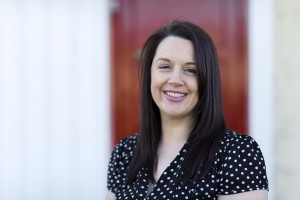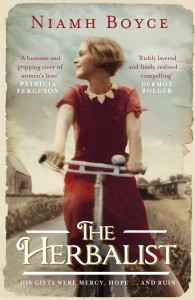Diving Into the Silence: Writing Inspired by Real Life
 My novel, The Herbalist, is set within living memory (1939) – and is based on a real-life court case I came across when I was nineteen.
My novel, The Herbalist, is set within living memory (1939) – and is based on a real-life court case I came across when I was nineteen.
I was archiving yellowed local broadsheets crammed with small print when I noticed a tiny article. It referred to an Indian Herbalist who was arrested for an ‘offence against a girl.’ What was an Indian herbalist doing in a small town in the Irish midlands, in the late thirties? What was his crime? What happened to him? A word popped into my head – scapegoat. I searched subsequent editions of the paper but there wasn’t any more information on the crime. I forgot about him.
Almost twenty years later, I began to write. And I remembered the herbalist and the girl, and all I did not know about them. So I wrote a short story, which grew into a longer story – that eventually showed signs of wanting to become a novel.
How much fiction, how much fact?
This was my first decision. How far I would delve into the real case and its consequences? How much I would fictionalise? I went to the library, searched the microfiche files and printed off that old article. It was three sentences long. There was a palpable silence between those sentences. It told me nothing. And it was a nothing I was ready to dive into.
I bought a Collins notebook, and began. The voices that came when I wrote were those of the women and girls that knew The Herbalist. They rushed from my pen. I had little to do with the process, it was as if the voices were truly confiding, telling secrets. In reality, the secrets of that summer, the summer of The Herbalist, would never have been passed on. I was very aware of that fact. As Rose says in the book… You wouldn’t know it but it’s my story. You won’t find me in the column inches. You won’t find me in the newsprint. You’ll find me in the gaps, the commas, the full stops – the small dark spaces where one thing led to another.
 The women spoke from those dark spaces, and I wrote as quickly as I could. I wanted to enter the world of the novel and stay immersed in it. I was afraid the spell would be broken if I took too long over the first draft. Not that I wrote in a bubble – I work for a living, I have children – but I protected the early and late hours for the world of the herbalist, for the world of the women, the river, the potions, the magic, the darkness.
The women spoke from those dark spaces, and I wrote as quickly as I could. I wanted to enter the world of the novel and stay immersed in it. I was afraid the spell would be broken if I took too long over the first draft. Not that I wrote in a bubble – I work for a living, I have children – but I protected the early and late hours for the world of the herbalist, for the world of the women, the river, the potions, the magic, the darkness.
When the first draft was complete, I researched in earnest. I read archives, depositions, and evidence. I listened to local lore. In an eerie coincidence, my first draft echoed the real life case, echoed the voices I had heard. But now that I knew the real details, I had to make a decision – again…
How much fiction, how much fact?
I did not want to exploit or expose living people, so I decided my story would not be a ‘true –life’ version, or what is often termed ‘faction.’ It would be completely fictional. Writing the full draft completely from my imagination protected the integrity of that fictional world. But if course, you can’t ‘unknow’ something, so the truth of the matter did inform the final work, made it darker, more complex.
For the sociological details- I researched as I went, in bite size chunks rather than one big block. I wanted to absorb the atmosphere and texture of the times – the music, the films, clothes, medicines, politics, social life, habits, food. I wanted them to flow into the story as I wrote rather than be consciously incorporated as ‘facts.’ The purpose of research is to bring the book to life, not to weight it down. A novel should feel immediate, even if it’s set in the past. And that’s down to voice, voice comes first, and research last, for every time the book is opened, it’s the voices that reawaken to say, ‘you wouldn’t know it but it’s my story…’
—
Niamh Boyce’s novel The Herbalist (Penguin Ireland) won Newcomer of the Year at the Irish Book Awards and has been nominated for the 2015 IMPAC award. She won Hennessy XO Writer of the Year and her unpublished poetry collection, The Beast Is Dead, was highly recommended in the 2013 Patrick Kavanagh Poetry Award. She is currently working on a novel and a collection of short stories.
Buy the herbalist HERE
Find out more about Niamh on her website: http://niamhboyce.blogspot.ie
.
Category: Contemporary Women Writers, On Writing
Comments (11)
Trackback URL | Comments RSS Feed
Sites That Link to this Post
- Reading Niamh Boyce’s The Herbalist | between the coffee bean and tea leaf | October 20, 2015
























Oh my God, Niamh! I read this article without a stop to breathe! I’ve been struggling to finish my novel and the way you describe “the voices that just kept telling you the story” just make me want to lock myself in The Shed and write until I faint… haha.
I sooo must read this book! Will order it now. Can’t wait.
lol, locking the sheds an excellent idea Dani – I know exactly what you mean! Keep going!
I found this vary interesting as I am writing about a similar era. I recognize some of your experience here.
thanks Gill, good luck with your own writing, its a fascinating time period!
“There was a palpable silence between those sentences. It told me nothing. And it was a nothing I was ready to dive into.” — words from a true writer.
thanks Linda, I nearly drowned :)!
Isn’t it fascinating when some aspect of something you come across captures your imagination — as if it’s begging to be a story and won’t let you be into you write it, even twenty years later? I know that feeling, too, when the voices of characters become authentic enough to take over, as you put it. Sounds like a very compelling story.
It is fascinating DeboraH, it can be surprizing what we end up writing about, sometimes there’s a feeling of no choice being made at all 🙂 And thanks for commenting!
I love your description of how this story came about — from a snippet of curious news, to a deeper dive into your subconscious (or divine inspiration??), to actual research… and finally, a combination of fact and fiction. I also like your point about not weighing the story down with historical details. Some books I’ve read do lay on the facts in huge chunks which draw attention to themselves, as if the author feels he/she has to prove how much research was done in writing the book!
I know what you mean about research Louisa, and sometimes it can be so fascinating it can take the novel off down other plot line altogether, which almost happened with my work in progress, I’m glad you liked the story of my how the herbalist came to be, a twenty year gap between the inspiration and its realisation but it worked out well 🙂 Thanks for commenting 🙂 Niamh